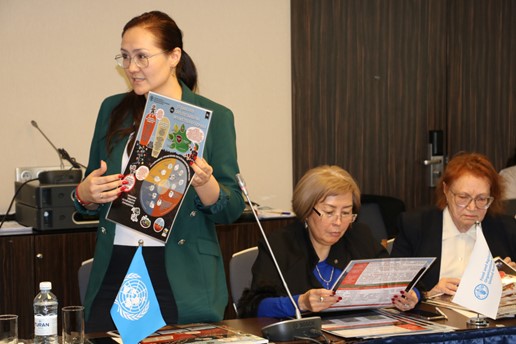Towards soil recarbonization in Kazakhstan through the RECSOIL initiative
Kazakhstan, the world’s ninth-largest country, covers an area of 2.72 million square kilometres. Soil health is crucial to the country’s agricultural sector, which has to meet global demands, but currently faces soil carbon loss and soil pollution. To promote soil health, increase soil organic carbon (SOC) stocks, and address soil pollution, the FAO’s Global Soil Partnership (GSP) has taken steps to introduce the Recarbonization of Global Agricultural Soils (RECSOIL) initiative in Kazakhstan. In collaboration with FAO Kazakhstan and the Ministry of Agriculture, the GSP has successfully taken steps towards soil recarbonization and soil pollution remediation through meetings clarifying key actors in soil research and management and Kazakhstan, bilateral discussions with government representatives, and holding two RECSOIL workshops to engage and identify project partners.
.jpg)
The RECSOIL initiative, in collaboration with the Global Soil Doctors Programme and technical networks such as the International Network on Soil Pollution (INSOP), the Global Soil Laboratory Network (GLOSOLAN), the International Network of Black Soils (INBS) and the International Network of Salt-affected Soil (INSAS), all of which are part of the GSP, will join forces to enhance soil health and boost soil carbon on agricultural and degraded lands by partnering with farmers, soil scientists, government representatives, and others.
This mission sought to strengthen the close partnership between the GSP and FAO Kazakhstan through bilateral meetings in Astana with current project proponents with whom RECSOIL will partner on the first day. Furthermore, a meeting was held with representatives from the Ministry of Agriculture (MoA), Murat Temirzhanov, the UNCCD National Focal Point and Chair of the Committee for Land Resources Management of the MoA of Kazakhstan, and with the Head of the State Institute for Land Survey Work (GIPROZem), Gulzhakhan Bimendina. The meeting resulted in firm support from the MoA of Kazakhstan to launch RECSOIL with the two target regions for project implementation identified.
Building on the context gained through bilateral meetings on the first day, the GSP sought to engage stakeholders through workshops presenting RECSOIL to potential project partners on February 6 in Astana and February 8 in Almaty.
The workshops goal were to:
- Prevent future soil organic carbon losses and increase current carbon stocks;
- Improve farmers' livelihoods;
- Contribute to climate change mitigation and increased resilience; and
- Contribute to food security and sustainable development.
During the introductory RECSOIL sessions, experts from 35 institutions identified some of the most common threats to soil health in the country, which are erosion, salinity, soil and water pollution, soil compaction and climate change. Both workshops included in-depth RECSOIL presentations, enriched discussions, interactive sessions on reviewing the Global Soil Doctors Programme posters and field exercises, and a proposal to launch a National Soil Partnership in Kazakhstan. At the end of the workshops, participants proposed two regions for implementing the RECSOIL: the Kostanay region in the north of Kazakhstan and the Almaty region in the south. Once the proposed regions are approved by the MoA and implementing partners are identified, the project will enter into the next phase: technical training and capacity building.
Furthermore, meetings with the representatives from the Kazakh Agrotechnical Research University (KATRU) in Astana and the Kazakh Research Institute of Soil Science and Agrochemistry named after U. Uspanov in Almaty gave an insight into the ongoing soil pollution projects in the country. On February 9, the final day of the mission, the GSP visited the Scientific Analytical Center, LLP, laboratory and the Kazakh Research Institute to determine how to partner with facilities to analyse and address soil pollution. It has been observed that pesticides, heavy metals, and radionuclide pollution are the most significant contaminants that require immediate attention and action. Experts from the INSOP will support the development of customized modules for the Global Soil Doctors Programme to be implemented in the country. These modules will focus on training farmers on the best prevention, adaptation and mitigation practices for soil pollution.
In addition, Kazakhstan is currently in the process of developing a soil law with the primary objective of safeguarding the soil and preventing its degradation. To ensure the successful implementation of the law, the GSP met with the parliamentary representative at FAO office in Astana. During the meeting, the parliamentary representative requested the GSP to provide valuable insights into the initial draft of the law. The goal is to ensure that all essential components of soil protection are integrated into the law and that the relevant authorities are involved in carrying out their duties efficiently.

RECSOIL workshop in Astana and its guests giving a feedback on Global SoilDoctors Programme posters.
